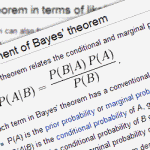What is an Ad Hominem Fallacy?
by Dr. Edward Feser
Filed under Culture
NOTE: Dr. Feser's contributions at Strange Notions were originally posted on his own blog, and therefore lose some of their context when reprinted here. Dr. Feser explains why that matters.
As students of logic know, not every appeal to authority is a fallacious appeal to authority. A fallacy is committed only when the purported authority appealed to either does not in fact possess expertise on the subject at hand, or can reasonably be supposed to be less than objective. Hence if you believed that PCs are better than Macs entirely on the say-so of either your technophobic orthodontist or the local PC dealer who has some overstock to get rid of, you would be committing a fallacy of appeal to authority—in the first case because your orthodontist, smart guy though he is, presumably hasn’t much knowledge of computers, in the second case because while the salesman might have such knowledge, there is reasonable doubt about whether he is giving you an unbiased opinion. But if you believed that PCs are better than Macs because your computer science professor told you so, there would be no fallacy, because he presumably both has expertise on the matter and lacks any special reason to push PCs on you. (That doesn’t necessarily mean he’d be correct, of course; an argument can be mistaken even if it is non-fallacious.)
Similarly, not every ad hominem attack—an attack “against the man” or person—involves a fallacious ad hominem. “Attacking the man” can be entirely legitimate and sometimes even called for, even in an argumentative context, when it is precisely the man himself who is the problem.
Attacking a person involves a fallacy when what is at issue is whether some claim the person is making is true or some argument he is giving is cogent, and where the attacker either (a) essentially ignores the question of whether the claim is true or the argument cogent, and instead just attacks the person giving it (in which case we have a kind of red herring fallacy) or (b) suggests either explicitly or implicitly that the claim can be rejected false or the argument rejected as not cogent on the basis of some irrelevant purported fault of the person giving it (in which case we have a poisoning the well fallacy, or perhaps a tu quoque).
Hence, suppose you put forward an argument against “same-sex marriage” and someone responds either by calling you a bigot, or by suggesting that the only reason you are putting forward such an argument is to rationalize some religiously motivated prejudice. Here we have classic examples of ad hominem fallacies. In the first case the person responding to you is trying to change the subject—trying to make you and your alleged bigotry the issue, where what is at issue is the cogency of your argument. In the second case, the person is not changing the subject—he is addressing the question of whether your argument is cogent—but he is nevertheless appealing to an irrelevant consideration in assessing its cogency, since whether your argument is cogent or not has nothing essentially to do with your motives for putting it forward.
However, if what is at issue is not a person’s claim or argument, but rather precisely some aspect of the person himself, there is no fallacy in calling attention to his defects, and in some cases it can even be entirely appropriate to do so in a polemical fashion.
For example, suppose what is at issue is whether a certain person is a reliable witness or an unbiased source of information, as in a court case. Then there is no fallacy whatsoever in showing that his track record reveals him to be a compulsive liar, or to have a bad memory or bad eyesight, or to have been drunk at the time of the events he claims to have witnessed, or to have a personal stake in the outcome of the case. These are ad hominem criticisms—criticisms directed “against the man” himself—but there is no fallacy involved, because the credibility of the man himself is precisely what is at issue.
Or suppose that what is at issue is, again, not whether a certain claim is true or a certain argument cogent, but instead whether a certain person is reasonable, intellectually honest, worth trying to have a conversation with, etc. For example, suppose someone in a combox shows himself by his pattern of behavior to be a crank or a troll, say by repeatedly making sweeping, ungrounded, or unhinged assertions, dismissing ideas and arguments he evidently does not even understand or books he hasn’t bothered to read, or indeed by committing ad hominem and other fallacies right and left. There is in such a case nothing wrong with calling such a person a crank or a troll, and refusing to engage with him any further. That is certainly an attack on the person, but it is no fallacy. It is just a straightforward inference from the facts, a well-founded judgment about him and his behavior, rather than a fallacious response to some argument he has given.
Or suppose someone gains a reputation for expertise on some important matter of public controversy when in fact his views about the matter are laughably off-base and demonstrably ill-informed. Suppose further that he manifests extreme arrogance and dismissiveness toward those who actually do have expertise on the matter, where the fact of his unjustified self-confidence only serves to reinforce, in those who don’t know any better, the false impression that he must know what he is talking about. Here too an attack on the person himself is legitimate precisely because what is at issue is one of his personal qualities, viz. his arrogant pretense of expertise. Indeed, ridicule and other polemical methods can be legitimate tools in such an attack, since arrogant pretense can often effectively be countered in no other way, and treating the offender more gently might only reinforce the false impression that he and his views are respectable.
Another example. The tu quoque is a species of ad hominem fallacy in which a claim is rejected merely because the person advancing it does not act in a way consistent with it. But there are cases where the fact that a person’s actions are inconsistent with the claim he is making is clearly relevant to evaluating the claim. Suppose, for instance, that someone asserts that it is not possible to make assertions. This is a performative self-contradiction, and while the probative value of identifying performative self-contradictions is a matter of philosophical controversy, it is legitimate at least to wonder whether a view that entails such a contradiction is coherent. If someone could carry out a certain course of action that he recommends to others but does not bother even to try to do so himself—the lush who condemns others for their drinking, say—that by itself obviously does not show that his advice is not good advice. Mere hypocrisy is not of much epistemological interest. But if there is reason to think that someone could not even in principle adopt a certain policy, then it is at least questionable whether the policy is a good one, or reflects a coherent train of thought.
Finally, there are certain positions the very entertaining of which cannot plausibly fail to reflect some degree of moral defect in the person who advances them. For moral character involves, in part, the having of morally upright sensibilities, and these sensibilities will tend to lead a person to regard certain actions as beyond the pale and unworthy of serious consideration. Hence that a given person does not so regard them is evidence of defective sensibilities. Suppose, for example, that someone seriously suggested that there are good arguments in defense of torturing babies “for fun.” It is hard to see how someone could sincerely believe such a thing unless his moral sensibilities were deeply corrupt. (Whether he is culpable for this corruption is a question I leave to one side as irrelevant to the present point.)
Notice what I am not saying. I am not saying that “You are a bad person; therefore your argument is invalid!” is a good response. It is not a good response; that would be an ad hominem fallacy. If the practices a person is defending really are immoral, there should be independent reasons, having nothing to do with his personal character, that show that they are.
All the same, if they are immoral, and if moral character is in part a matter of having the right sensibilities, and if a person shows by what he is willing to regard as a live option that he does not have the right sensibilities, then there is no fallacy in pointing this out. Indeed, not to point it out might in some cases threaten to undermine the moral sensibilities that prevail in society at large, insofar as it might make certain immoral actions seem respectable or defensible. (For more on this issue, see my discussion of Elizabeth Anscombe’s views on the subject.)
There are at least five sorts of case, then, in which criticism “of the man” can be legitimate and certainly not fallacious, even when the larger context is one in which arguments are being weighed: when determining whether someone’s testimony is likely to be reliable; when evaluating his worthiness as a philosophical conversation partner; when exposing the fraudulence of his public reputation for expertise on some matter; when exposing performative self-contradictions associated with some philosophical position; and when noting that a person’s willingness to take certain views seriously is evidence of a corruption of his moral sensibilities. None of this shows that a person’s claims or arguments themselves are undermined merely by calling attention to his personal defects. To suppose that it does would be fallacious. But those who shout “Ad hominem!” too often do not know what an ad hominem fallacy actually is.
Related Posts
Note: Our goal is to cultivate serious and respectful dialogue. While it's OK to disagree—even encouraged!—any snarky, offensive, or off-topic comments will be deleted. Before commenting please read the Commenting Rules and Tips. If you're having trouble commenting, read the Commenting Instructions.













